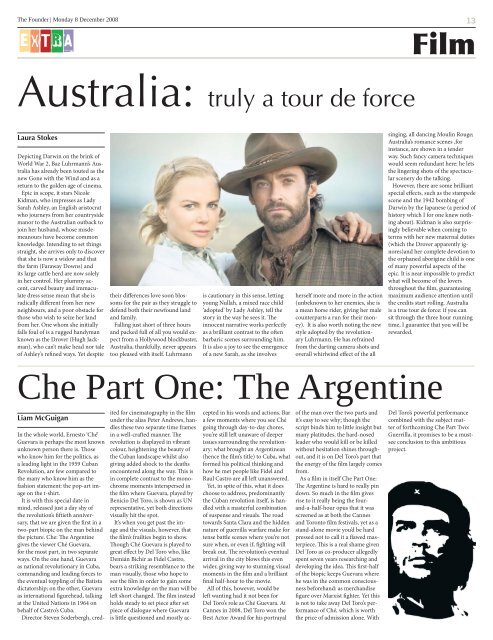Holloway mourns death of student - The Founder
Holloway mourns death of student - The Founder
Holloway mourns death of student - The Founder
You also want an ePaper? Increase the reach of your titles
YUMPU automatically turns print PDFs into web optimized ePapers that Google loves.
<strong>The</strong> <strong>Founder</strong> | Monday 8 December 2008<br />
E X T R A<br />
13<br />
Film<br />
Australia: truly a tour de force<br />
Laura Stokes<br />
Depicting Darwin on the brink <strong>of</strong><br />
World War 2, Baz Luhrmann’s Australia<br />
has already been touted as the<br />
new Gone with the Wind and as a<br />
return to the golden age <strong>of</strong> cinema.<br />
Epic in scope, it stars Nicole<br />
Kidman, who impresses as Lady<br />
Sarah Ashley, an English aristocrat<br />
who journeys from her countryside<br />
manor to the Australian outback to<br />
join her husband, whose misdemeanours<br />
have become common<br />
knowledge. Intending to set things<br />
straight, she arrives only to discover<br />
that she is now a widow and that<br />
the farm (Faraway Downs) and<br />
its large cattle herd are now solely<br />
in her control. Her plummy accent,<br />
carved beauty and immaculate<br />
dress sense mean that she is<br />
radically different from her new<br />
neighbours, and a poor obstacle for<br />
those who wish to seize her land<br />
from her. One whom she initially<br />
falls foul <strong>of</strong> is a rugged handyman<br />
known as the Drover (Hugh Jackman),<br />
who can’t make head nor tale<br />
<strong>of</strong> Ashley’s refined ways. Yet despite<br />
their differences love soon blossoms<br />
for the pair as they struggle to<br />
defend both their newfound land<br />
and family.<br />
Falling just short <strong>of</strong> three hours<br />
and packed full <strong>of</strong> all you would expect<br />
from a Hollywood blockbuster,<br />
Australia, thankfully, never appears<br />
too pleased with itself. Luhrmann<br />
is cautionary in this sense, letting<br />
young Nullah, a mixed race child<br />
‘adopted’ by Lady Ashley, tell the<br />
story in the way he sees it. <strong>The</strong><br />
innocent narrative works perfectly<br />
as a brilliant contrast to the <strong>of</strong>ten<br />
barbaric scenes surrounding him.<br />
It is also a joy to see the emergence<br />
<strong>of</strong> a new Sarah, as she involves<br />
herself more and more in the action<br />
(unbeknown to her enemies, she is<br />
a mean horse rider, giving her male<br />
counterparts a run for their money).<br />
It is also worth noting the new<br />
style adopted by the revolutionary<br />
Luhrmann. He has refrained<br />
from the darting camera shots and<br />
overall whirlwind effect <strong>of</strong> the all<br />
singing, all dancing Moulin Rouge;<br />
Australia’s romance scenes ,for<br />
instance, are shown in a tender<br />
way. Such fancy camera techniques<br />
would seem redundant here: he lets<br />
the lingering shots <strong>of</strong> the spectacular<br />
scenery do the talking.<br />
However, there are some brilliant<br />
special effects, such as the stampede<br />
scene and the 1942 bombing <strong>of</strong><br />
Darwin by the Japanese (a period <strong>of</strong><br />
history which I for one knew nothing<br />
about). Kidman is also surprisingly<br />
believable when coming to<br />
terms with her new maternal duties<br />
(which the Drover apparently ignores)and<br />
her complete devotion to<br />
the orphaned aborigine child is one<br />
<strong>of</strong> many powerful aspects <strong>of</strong> the<br />
epic. It is near impossible to predict<br />
what will become <strong>of</strong> the lovers<br />
throughout the film, guaranteeing<br />
maximum audience attention until<br />
the credits start rolling. Australia<br />
is a true tour de force: if you can<br />
sit through the three hour running<br />
time, I guarantee that you will be<br />
rewarded.<br />
Che Part One: <strong>The</strong> Argentine<br />
Liam McGuigan<br />
In the whole world, Ernesto ‘Ché’<br />
Guevara is perhaps the most known<br />
unknown person there is. Those<br />
who know him for the politics, as<br />
a leading light in the 1959 Cuban<br />
Revolution, are few compared to<br />
the many who know him as the<br />
fashion statement: the pop-art image<br />
on the t-shirt.<br />
It is with this special date in<br />
mind, released just a day shy <strong>of</strong><br />
the revolution’s fiftieth anniversary,<br />
that we are given the first in a<br />
two-part biopic on the man behind<br />
the picture. Che: <strong>The</strong> Argentine<br />
gives the viewer Ché Guevara,<br />
for the most part, in two separate<br />
ways. On the one hand, Guevara<br />
as national revolutionary in Cuba,<br />
commanding and leading forces to<br />
the eventual toppling <strong>of</strong> the Batista<br />
dictatorship; on the other, Guevara<br />
as international figurehead, talking<br />
at the United Nations in 1964 on<br />
behalf <strong>of</strong> Castro’s Cuba.<br />
Director Steven Soderbergh, cred-<br />
ited for cinematography in the film<br />
under the alias Peter Andrews, handles<br />
these two separate time frames<br />
in a well-crafted manner. <strong>The</strong><br />
revolution is displayed in vibrant<br />
colour, heightening the beauty <strong>of</strong><br />
the Cuban landscape whilst also<br />
giving added shock to the <strong>death</strong>s<br />
encountered along the way. This is<br />
in complete contrast to the monochrome<br />
moments interspersed in<br />
the film where Guevara, played by<br />
Benicio Del Toro, is shown as UN<br />
representative, yet both directions<br />
visually hit the spot.<br />
It’s when you get past the image<br />
and the visuals, however, that<br />
the film’s frailties begin to show.<br />
Though Ché Guevara is played to<br />
great effect by Del Toro who, like<br />
Demián Bichir as Fidel Castro,<br />
bears a striking resemblance to the<br />
man visually, those who hope to<br />
see the film in order to gain some<br />
extra knowledge on the man will be<br />
left short changed. <strong>The</strong> film instead<br />
holds steady to set piece after set<br />
piece <strong>of</strong> dialogue where Guevara<br />
is little questioned and mostly accepted<br />
in his words and actions. Bar<br />
a few moments where you see Ché<br />
going through day-to-day chores,<br />
you’re still left unaware <strong>of</strong> deeper<br />
issues surrounding the revolutionary:<br />
what brought an Argentinean<br />
(hence the film’s title) to Cuba, what<br />
formed his political thinking and<br />
how he met people like Fidel and<br />
Raul Castro are all left unanswered.<br />
Yet, in spite <strong>of</strong> this, what it does<br />
choose to address, predominantly<br />
the Cuban revolution itself, is handled<br />
with a masterful combination<br />
<strong>of</strong> suspense and visuals. <strong>The</strong> road<br />
towards Santa Clara and the hidden<br />
nature <strong>of</strong> guerrilla warfare make for<br />
tense battle scenes where you’re not<br />
sure when, or even if, fighting will<br />
break out. <strong>The</strong> revolution’s eventual<br />
arrival in the city blows this even<br />
wider, giving way to stunning visual<br />
moments in the film and a brilliant<br />
final half-hour to the movie.<br />
All <strong>of</strong> this, however, would be<br />
left wanting had it not been for<br />
Del Toro’s role as Ché Guevara. At<br />
Cannes in 2008, Del Toro won the<br />
Best Actor Award for his portrayal<br />
<strong>of</strong> the man over the two parts and<br />
it’s easy to see why; though the<br />
script binds him to little insight but<br />
many platitudes, the hard-nosed<br />
leader who would kill or be killed<br />
without hesitation shines throughout,<br />
and it is on Del Toro’s part that<br />
the energy <strong>of</strong> the film largely comes<br />
from.<br />
As a film in itself Che Part One:<br />
<strong>The</strong> Argentine is hard to really pin<br />
down. So much in the film gives<br />
rise to it really being the fourand-a-half-hour<br />
opus that it was<br />
screened as at both the Cannes<br />
and Toronto film festivals, yet as a<br />
stand-alone movie you’d be hard<br />
pressed not to call it a flawed masterpiece.<br />
This is a real shame given<br />
Del Toro as co-producer allegedly<br />
spent seven years researching and<br />
developing the idea. This first-half<br />
<strong>of</strong> the biopic keeps Guevara where<br />
he was in the common consciousness<br />
beforehand: as merchandise<br />
figure over Marxist fighter. Yet this<br />
is not to take away Del Toro’s performance<br />
<strong>of</strong> Ché, which is worth<br />
the price <strong>of</strong> admission alone. With<br />
Del Toro’s powerful performance<br />
combined with the subject matter<br />
<strong>of</strong> forthcoming Che Part Two:<br />
Guerrilla, it promises to be a mustsee<br />
conclusion to this ambitious<br />
project.














